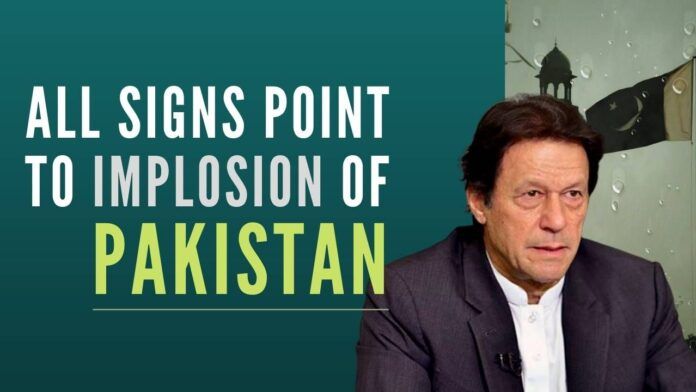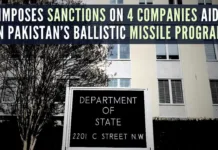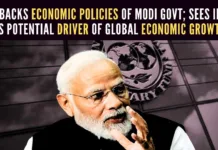
As a nation, Pakistan’s identity is projected on what it is not, rather than what it ought to be as a homeland for Muslims of the Indian sub-continent. While they riot and cause mayhem for issues of Islamic pride like they did for the Charlie Hebdo cartoons or support for the Palestinians, their silence on the genocide of Uyghur Muslims or the Kurds shows their hypocrisy and ideological confusions. The need for the ideological justification of its existence takes primacy over all else, including the welfare and progress of its citizens. The decline of the state of Pakistan, its social structures, its institutions and even its ideology has been going on for many years now, and it picked up speed in the last 3-4 years.
Economy
Pakistan had a much stronger economy than that of Bharat in the first two decades after their separation in 1947. In fact, Bharat’s growth under the Nehruvian socialism was called the `Hindu rate of growth’ and the much stronger Pakistani economic growth was quoted to justify the partition. To cut the story to the present, the budgeted tax revenues for the year 2020-21, though inflated unrealistically, pegs it at $USD 19 billion, and the budgeted debt repayment obligation stands at $17 billion, which is approximately 85%+ of its tax collections. The Coronavirus pandemic dealt a massive blow to its economic fundamentals thus depriving much needed budgetary allocations for its health, education and infrastructure needs. However, even in such gloomy economic conditions, the Defence budget was hiked by 11% to approximately $10.5 billion. Effectively the Pakistani armed forces are running on borrowed funds. It is clearly unsustainable to maintain the nuclear deterrence on borrowed funds depriving large sections of the society of their basic survival needs. Former PM Late Zulfikar Ali Bhutto had said in the mid-70s that “If India builds the bomb, we will eat grass or leaves, even go hungry, but we will get one of our own”. Today Pakistan has the bomb, but nearly half the population is hungry and starving. The CPEC had made them a vassal state of China with unpayable debt, and the current IMF bailouts are also thanks to the US approval. The only worrying reason for the west to continue bailouts to Pakistan is the fear of their nuclear weapons falling into wrong hands. But when the inflexion point arrives, as it happened to the Soviet Union, no amount of external props can stop the implosion of the country, with or without nuclear weapons.
The situation has become farcical as a powerless civilian government is being projected merely to avoid sanctions for military rule. Such a set-up is neither desirable nor sustainable in the long term.
Erosion of government and its institutions
Since the partition days, Pakistan had a troublesome relationship with democracy. For a significant part of its existence, it was ruled directly or indirectly by the army and the deep-state. The short bursts of democratic rule were invariably sabotaged by the army thus not allowing democracy to succeed in the country. All institutions associated with the government were subverted, compromised, misused or abused to make them toothless and ineffective. Even the judiciary was largely arm-twisted into doing the bidding of the deep-state. Popular leaders like Zulfikar Ali Bhutto and Benazir Bhutto were either eliminated through judicial process or by extra-judicial killings. Most of the former head of government are in exiles like Nawaz Sharif and General Musharraf. The misuse of the National Accountability Bureau (NAB) in arresting and sidelining all potential political opponents shows the compromised nature of their institutions. While Imran Khan is legally the Prime Minister, almost all the important institutions of Governance are headed by serving or retired officers of armed forces. General Asim Bajwa is the chairman of CPEC (China–Pakistan Economic Corridor) Authority, other bodies like PEMRA (Pakistan Electronic Media Regulatory Authority), NEPRA (National Electric Power Regulatory Authority) etc., have officers from armed forces on their boards or take diktats from GHQ (General Headquarters)/ ISI (Inter-Services Intelligence). All key foreign policy decisions are authorized by the army while the civilian-political establishment is required to parrot their lines. The situation has become farcical as a powerless civilian government is being projected merely to avoid sanctions for military rule. Such a set-up is neither desirable nor sustainable in the long term.
Radicalization of society and the armed forces
The recent violence unleashed by Tehreek e Labbaik Pakistan (TLP) especially in Lahore demanding the expulsion of the French Ambassador is an indication of the extent of radicalization in Pakistani society. TLP is a registered political party with elected members in state assemblies and has emerged as a credible third or fourth in most parliamentary constituencies, and its numbers are growing by the day. Imran Khan’s PTI also won because of pandering to the radical Islamists while it was in opposition. The fact that Pakistan is still on the grey list of the FATF (Financial Action Task Force), proves the point that the world has recognized its support to radicalized Islamic terror. European Parliament passed resolutions recently asking its member countries to withdraw GSP+ status to Pakistan due to continuous persecution of its minorities, especially using draconian laws like the Blasphemy law. The non-stop abduction, conversion and marrying off of Hindu minor girls is a sad barometer of the societal radicalization in Pakistan. The desperate cries for justice from the parents of the girls fall on deaf ears of the administration, political leadership, civil society and even the judiciary. A recent court judgment stated that once a girl is converted to Islam, she cannot be reconverted to her old religion even if she is a minor. It is a well-known fact that Madrasas are breeding grounds of radical Jihadi fighters feeding into various terrorist groups in the region. Sections of the army are similarly radicalized as the personnel join from the very same society. The army training includes indoctrination of Islamic supremacy and hates for Jews, Israel, Hindus and Bharat. This was evident when several soldiers came out in support of TLP during the recent rioting. When the other institutions of the state start crumbling, the radical elements of the army could gain disproportionate power posing a significant security threat to the region and beyond.
Deepening of sectarian fault-lines
The ideology of Pakistan as a state for Muslims of the sub-continent hoping to unite different ethnic groups under the umbrella of Islam failed in 1971 with the loss of East-Pakistan that became Bangladesh. The ethnic fault-lines in West-Pakistan were attempted to be managed by the opium of Islamic brotherhood and hatred for Hindu Bharat. 20 years of American largesse funded ruthless suppression of sectarian identities.
The withdrawal of Coalition forces from Afghanistan significantly reduces the geo-strategic importance of Pakistan, leaving only China interested in Pakistan for its own access to the Indian Ocean.
- Balochistan: The Baluchi liberation movement, though fragmented, is still ongoing for more than 3 generations since its forced annexation by Pakistan. The killing of Kareema Baloch in Canada has further alienated the Baluchis from the agenda of Pakistan. Their pain has been accentuated with the Chinese involvement in Gwadar port and parts of CPEC that pass through their territories. Baluchi oil and minerals are looted by the Pakistani Punjabis leaving the Balochis in penury and destitution.
- Sindh: The Jiye-Sindh movement has joined hands with the Mohajir leadership to fight for their rights and demanding independence from Pakistan. The Pakistani establishment tried to counter it by infusing Islamic radicalization in the interiors of Sind, which had largely remained unaffected by the religious madness till then. In an important development, Sindhis of Pakistani origin across the world recently celebrated the birth anniversary of Raja Dahir Sen, the last Hindu King of Sind who was defeated and killed by the 1st Muslim invader of Bharat, Mohammad Bin Qasim.
- Pashtuns: The Punjab establishment had used the Pashtuns as labor, without giving them the dignity as fellow Pakistani citizens. In the name of `war against terror’, the Pakistani establishment killed several Pashtuns and projected them as terrorists, to get funds from the US and NATO. Their peaceful protests under the banner of the Pashtun-Tahafuz Movement (PTM) is being unjustly and ruthlessly suppressed, several leaders arrested and branded as Indian agents. Post-withdrawal of the Coalition forces from Afghanistan, the Pashtuns on both sides of the Durand Line, would continue with their demand for a greater Pashtunistan.
- POJK: The demands for Azadi in Occupied Gilgit-Baltistan (PoGB) and Occupied Jammu & Kashmir (PoJK) are being suppressed ruthlessly and demographic changes are imposed to reduce the original inhabitants to minority status. The Chinese interests in Gilgit-Baltistan for passage of CPEC and extraction of minerals resulted in the state of Pakistan illegally grabbing the lands and livelihoods of the locals. This has led to severe resentment, frequent protests and agitations in the region.
Thus, there is no province in Pakistan that is devoid of either separatist or violent agitations.
Loss of geo-strategic importance
The withdrawal of Coalition forces from Afghanistan significantly reduces the geo-strategic importance of Pakistan, leaving only China interested in Pakistan for its own access to the Indian Ocean. Pakistan Army Chief General Bajwa had spoken recently about the desire to shift from geo-strategy to geo-economics by burying the past and restarting the relationship with Bharat. China started downgrading the CPEC project for several reasons. Firstly, an aggressive Bharat can pose a threat to the project in Gilgit-Baltistan, a legal territory of Bharat. Secondly, lack of cooperation from the Pakistani establishment in timely land acquisition and other logistics. Thirdly, China signed a 25-year deal with Iran for a whopping $US400 billion, which includes transportation projects from Central Asia to the Iranian seaports. This is a more reliable alternative for China to access the Gulf and the Indian Ocean regions than a failing CPEC in Pakistan. With the US losing interest in Pakistan, China getting an alternative route via Iran, it is going to be an existential struggle for Pakistan. Therefore, it becomes imperative that Pakistan make itself relevant at least geo-economically by opening up trade with Bharat. Yet the deep-state of Pakistan is scuttling every move of rapprochement with Bharat. This could cause Pakistan to uncontrollably spiral into a failed anarchic state, posing threat to world peace due to their nuclear weaponry falling into ‘Wrong hands’.
The above red flags are pointing towards an imminent implosion of the state and society of Pakistan. The spillover of this implosion would have serious ramifications for Bharat’s economy and security. Bharat may be left with no option but to manage and administer parts of such a failed state. Managing a highly radicalized population would come at a heavy cost and would be a drag on the resources, economy, peace and tranquility of the nation. While the world powers will try to prop Pakistan up for some more time, the decay is deep, intense and irreversible. Pakistan’s implosion is a matter of when rather than if. The Indian establishment, think tanks and experts would have to seriously plan for this certainty and come up with possible solutions well in advance to avoid shocks to Bharat.
Note:
1. The views expressed here are those of the author and do not necessarily represent or reflect the views of PGurus.
- Crumbling throne of the Dragon - November 4, 2023
- Saving the Hindus of Bangladesh - August 14, 2023
- Time for Bharat to take over from India - May 24, 2022











Persuade Pakistan and Afghanistan to become Hindu again. The only way to stop radicalisation poverty and wars.